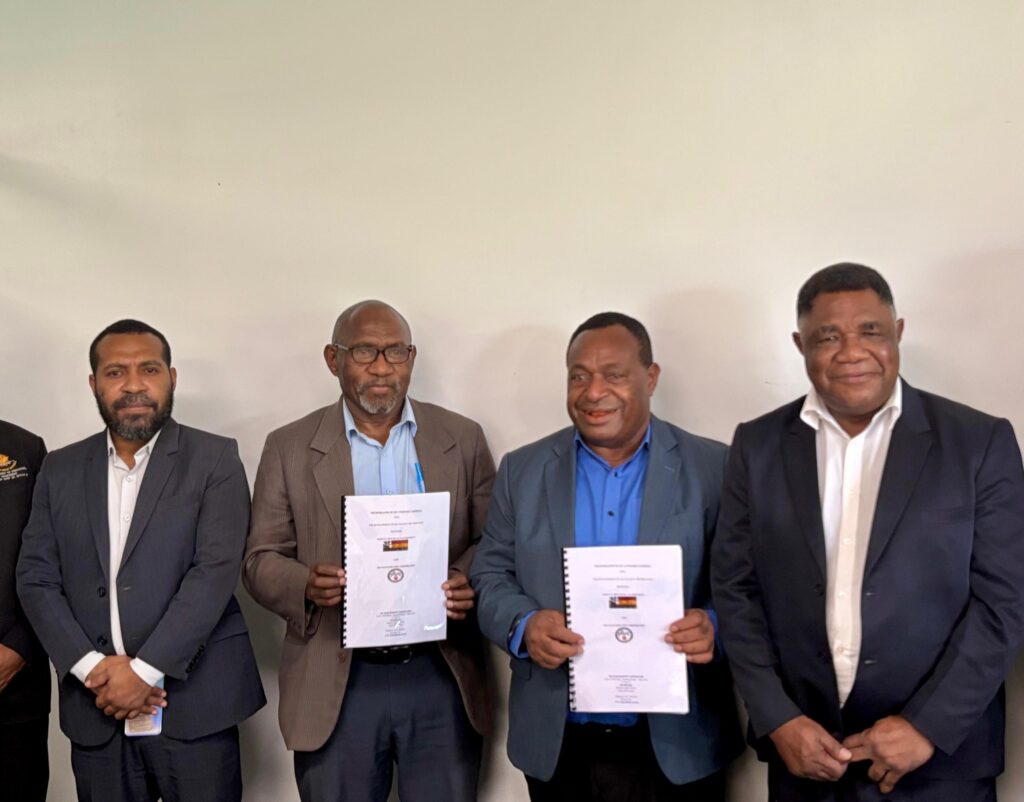Port Moresby, Thursday 17 April 2025 – General Secretary of the Oil Palm Industry Corporation (OPIC), Mr Kepson Pupita, has applauded the Madang Provincial Government for its decisive leadership in becoming the first provincial administration to sign a Memorandum of Understanding (MoU) with OPIC under a renewed national effort to grow Papua New Guinea’s oil palm sector.
Speaking during the official signing ceremony in Port Moresby — officiated by Minister for Oil Palm Hon. Francis Maneke and witnessed by Madang Governor Hon. Ramsey Pariwa — Mr Pupita described the event as a breakthrough moment for provincial collaboration and national agricultural development.
“This signing marks a significant milestone,” said Mr Pupita. “Governor Pariwa and his administration are the first to take up our invitation to formally partner with OPIC. It shows bold leadership and commitment to real economic development through agriculture.”
Mr Pupita emphasised that the Madang Provincial Government’s swift response stood out among invitations sent to 10 other provincial governments, and praised newly appointed Provincial Administrator Daniel Aloi for his active role in enabling the MoU.
“Your administration has shown that with vision and urgency, we can align national and local priorities. This partnership lays the groundwork for tangible, on-the-ground transformation,” he said.
Highlighting Madang’s strategic potential, Mr Pupita pointed to the presence of existing oil palm infrastructure—particularly in Ramu and Transgogol—as an opportunity to rapidly kickstart smallholder schemes.
“Madang is key to our business. You already have Ramu Agri Industries on one side, and Morobe Province on the other with established operations. These are low-hanging fruits. The infrastructure is in place. What we need now is to mobilise land and expand on that base,” he said.
He called for immediate action to commence development with small-scale plantings, suggesting that even 100 to 200 hectares would be enough to begin catalysing growth.
“We don’t need to wait for 10,000 or 20,000 hectares. Let’s be practical. If we can start with 100 hectares, that’s a base to build from. That’s real development,” Mr Pupita urged.

He also stressed the importance of PNG positioning itself within the global oil palm industry, referencing the nation’s engagement with the Council of Palm Oil Producing Countries (CPOPC), where Minister Maneke is an active participant.
“Papua New Guinea started developing oil palm in 1968, the same time as Malaysia and Indonesia. Today, Malaysia has 5.6 million hectares and Indonesia more than 23 million. We are still under 250,000 hectares. But we have the potential to grow over 10 million hectares,” Mr Pupita noted.
“We must learn from our neighbours. We’ve now aligned with global industry bodies like CPOPC, which opens doors for technical support, investment, and innovation. But we need to first organise ourselves at home.”
He concluded by reaffirming OPIC’s commitment to supporting Madang and other provinces willing to take the lead in oil palm development, saying: “Let Madang be the example. Let’s move from plans to action, starting today.”
The MoU is part of the broader efforts by the Marape-Rosso Government to advance commercial agriculture and rural empowerment as PNG celebrates 50 years of Independence.
###